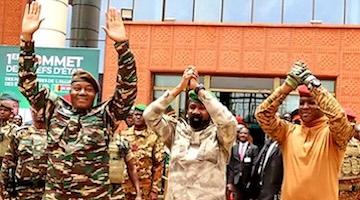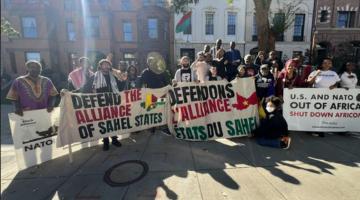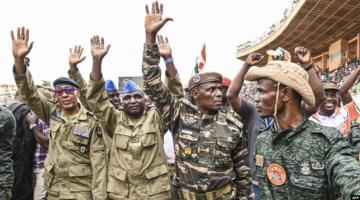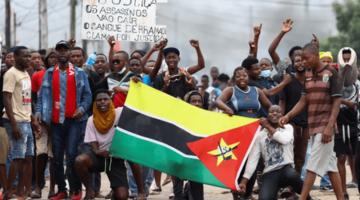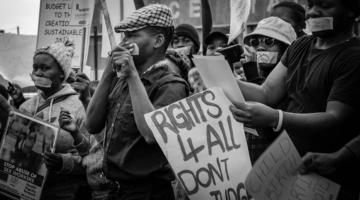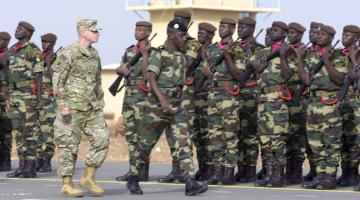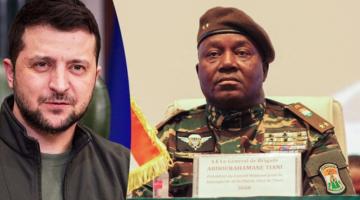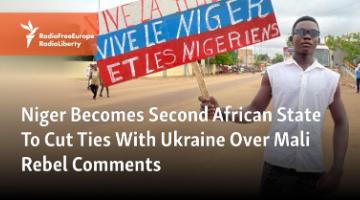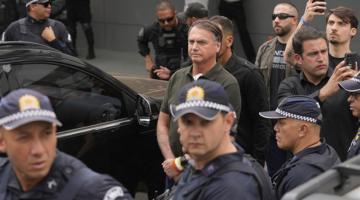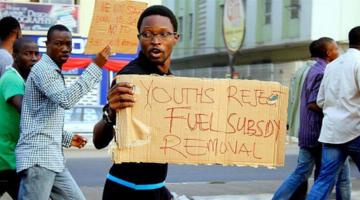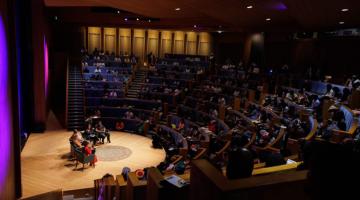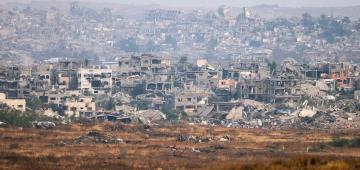Black Alliance for Peace reports on its US Out of Africa: Shut Down AFRICOM campaign in the AFRICOM Watch Bulletin.
This bulletin was originally published in Black Alliance for Peace.
The Nigerian military has been carrying out extrajudicial killings and forced disappearances of Igbo people in the south-eastern part of Nigeria. It's a region that is currently resisting militarized repression and experiencing a very intense crackdown. The "Biafran" movement, which is made up of Igbo people in the region, has a few organizations, including the Indigenous People of Biafra (IPOB), which the Nigerian government has designated a "terrorist" group and arrested its leader, Nnamdi Kanu, and the Movement for the Actualization of the Sovereign State of Biafra (MASSOB).
This situation has deep historical roots going back to the colonial period, as well as the 1967 Nigerian civil war that saw the defeat and dissolution of the state of Biafra, a war which multinational oil companies helped to spark by exacerbating ethnic tensions. The war also precipitated by a great deal of current-day discrimination against the Igbo people at the hands of other ethnic groups in Nigeria. A U.S./NATO/EU blockade during the war led to millions of Igbo deaths from starvation, disease and conflict, all to maintain access to the vast petroleum resources in the south eastern region. Shell-British Petroleum and the French state company Société Anonyme Française des Recherches et d’Exploitation de Pétrole (SAFRAP; now Elf Petroleum Nigeria Ltd.) were centrally involved in the bloodshed and exploitation.
Despite the formal independence and sovereignty of Nigeria, “its economic system and thus its political policy is directed from outside,” as Kwame Nkrumah wrote. Following the discovery of oil in Nigeria in the 1950s by Shell-BP, the British colonial government bolstered a system of Nigerian oil extraction tailored to foreign, mainly western corporations through a series of heavy concessions by the British government in Nigeria to foreign oil corporations that granted complete control over Nigeria’s resources to multinational corporations. As Nigerian author Bade Onimode argues, this system was bolstered by “political manipulation… market control and… collaboration with imperialists.” Neocolonial puppets in the Nigerian government, big bourgeois compradors, and corrupt civil and military officials are the elements collaborating with the west to maintain this state of affairs. This continues into the present day as 18 multinational oil companies that operate in Nigeria account for 99% of crude oil production in the entire country. Investors in the oil industry maintain large roles in the direction of the Nigerian government.
This ongoing brutality in Nigeria directed at the Igbo people and other parts of the Nigerian population is driven in large part by the militarization of the country. The army is currently deployed in at least 30 of Nigeria’s 36 states. The frequent deployment of Nigeria’s military has resulted in many cases of excessive use of force, extrajudicial executions and enforced disappearances throughout the country, and in particular in the northeast, southeast and north central regions. Brutal and oftentimes deadly repression of the Nigerian people needs to be seen as a tool of the imperialist system to maintain the “free flow of natural resources from Africa to the global market.” The U.S. has been quietly transforming Nigeria’s police and military into a neo-colonial force that can support missions led by the U.S. Africa Command (AFRICOM). The U.S. is also exporting weapons and sending special forces to train the Nigerian military to continue this barbarism.
U.S. OUT OF AFRICA: VOICES FROM THE STRUGGLE
AFRICOM Watch Bulletin speaks with Mark P. Fancher, who is an attorney and a member of the Black Alliance for Peace Africa Team. He is also a member of the National Conference of Black Lawyers and the All-African People's Revolutionary Party.
AFRICOM Watch Bulletin: Is there anything unique about US Foreign policy in Africa compared to other areas around the world?
Mark P. Fancher: Yes, there has always been a difference. While the U.S. is unable to deny its history of brazen imperialist military aggression in Central America, Southeast Asia, the Middle East and assorted other regions of the world, it never flagrantly colonized Africa in the way that European countries did. Although the U.S. is as guilty as any European colonizer, the U.S. has always been very careful to avoid the appearance of being an oppressor or exploiter of Africa. To that end, when imposing its will in Africa or exploiting the continent, the U.S. has used covert operations, puppet heads of state, quick-strike military attacks, and armed drones. This makes it easier for the U.S. to claim it is a “champion of democracy” and otherwise assume a holier than thou posture when, for its own advantage, it points accusing fingers at African governments and accuses them of being tyrannical, sponsors of terrorism, fiscally irresponsible, etc.
AWB: How has AFRICOM impacted US Foreign policy in Africa?
Mark P. Fancher: AFRICOM has made it much easier for the U.S. to lie and claim moral purity. While the U.S. would love to outright invade Africa militarily and lock it down once and for all for the benefit of U.S.-based corporations and the U.S. government’s geo-political strategic advantage, it could never get away with that. AFRICOM makes it possible for the U.S. to deploy its military personnel to almost every country in Africa, and at the same time have them remain practically invisible. U.S. soldiers hide behind the scenes, giving training and directions to African proxy troops. If asked about their presence, AFRICOM personnel claim that U.S. troops are in Africa digging wells and delivering medicine to villagers. It’s a ridiculous charade, and they get away with it because not many folks in the U.S. care what’s done in Africa.
AWB: I recently read the brilliant Palestinian legal scholar Noura Errakat's book, "Justice for Some," which focuses primarily on international law and Palestine. How can international law be used to reign in US Imperialistic initiatives in Africa?
Mark P. Fancher: While international law has limited potential as an effective deterrent to imperialist aggression, it nevertheless establishes norms for respect for human rights, self-determination, and the sovereignty of countries. International legal standards are generally either a matter of custom or provisions of international treaties – sometimes referred to as conventions or covenants. Unlike domestic laws passed by Congress that can be enforced by the government, there is usually no enforcement authority one can turn to when a country fails to comply with a convention. At best, establishing a violation of international law gives legitimacy to measures countries might take in response. These might include such things as sanctions, embargoes, or even military intervention. The U.S. is not likely to become the target of an embargo or anything of that sort. But establishing that it has consistently violated international law norms can tarnish its cherished image and remove any moral authority it might claim when threatening imperialist aggression.
AWB: When most African people, especially in the United States, discuss foreign presence in Africa, it is overwhelmingly sounding the alarm about China, in spite of USAFRICOM’s deadly military operations. Would this narrative be best combated by lobbying for change in US foreign policy or by pushing back on corporate media accounts which reinforce the notion of "China as the new colonizer."
Mark P. Fancher: Yes, the best response to this is truth-telling. Comparing the U.S. involvement in Africa with China’s engagement there is like comparing apples and oranges. Africans in the U.S. just need to know that the U.S. gives Africa death and China gives Africa highways, electricity, and railroads. We of course want Africa to get to where it can provide itself with infrastructure, but right now you can’t compare U.S. militarization strategies and China’s quid pro quo negotiations with African governments.
AWB: How else can everyday working-class African people join the struggle to push back against US Foreign policy in Africa?
Mark P. Fancher: I think we need to spend less energy trying to lobby U.S. government officials, and more energy engaging with representatives of African governments at their embassies. African governments need to know that Africans in the U.S. have their backs if they want to make efforts to disengage from AFRICOM. It’s high time for a Pan-African strategy for pushing AFRICOM out of Africa. Whatever that strategy might be, there will likely be a vital role for those of us in the proverbial belly of the beast.
AWB: Thank you for your time and analysis!
NEWS AND ANALYSIS
Many Africans Reject Washington’s Position on Ukraine Crisis
March 13, 2022 by Abayomi Azikiwe
Half of the countries abstaining from the United Nations General Assembly Resolution condemning Moscow were African Union member states.
France Withdraws from Mali, But Continues to Devastate Africa’s Sahel
February 25, 2022 by Vijay Prashad
French troops have now begun to leave Mali, but they are not returning to France. They will be deployed to next-door Niger, where they will continue their mission to prevent migration to Europe and to fight off the radicalized victims of IMF austerity.
US Launches Airstrike Against al-Shabaab in Somalia
February 23, 2022 by Dave DeCamp
AFRICOM launched an airstrike against al-Shabaab in Somalia. The Pentagon is notorious for undercounting civilian casualties, and the CIA also conducts drone strikes and raids in the country in secret.
NATO and Africa: A Relationship of Colonial Violence and Structural White Supremacy
February 23, 2022 by Djibo Sobukwe
NATO is the means of continuing colonial aggressions against African countries. It continues today in the form of AFRICOM facilitating wars, instability, and the corporate pillage of Africa.
The House Is Burning
February 17, 2022 by Hood Communist Collective
A statement from the Hood Communist editorial team about how Africa is a land that is ripe for revolution, even when it can’t be immediately seen.
Libya Remains a Failed State 11 Years After NATO Intervention
February 17, 2022 by teleSUR
The Western-backed overthrow of Muammar Gaddafi ushered in a period of political instability and violence that continues to this day.
Defend Mali
February 11, 2022 by Forward Ever Podcast
During this episode, they discuss the situation in Mali and why they believe all justice-loving people need to defend their struggle for sovereignty.
AU Ignores Foundational Values By Upholding Apartheid Israel’s Observer Status
February 7, 2022 by The Pan African Palestine Solidarity Network (PAPSN)
The Pan African Palestine Solidarity Network (PAPSN) issued this statement regarding the African Union (AU) Summit and the way that Israel’s ‘observer status’ was handled by AU leaders and new chair, Macky Sall.
If you are interested in getting more directly involved in the fight to liberate Africa, please consider joining the U.S. Out of Africa Network.
P.S. Freedom isn’t free. We are doing this work with no full time staff and no big foundation support. Consider giving today.


